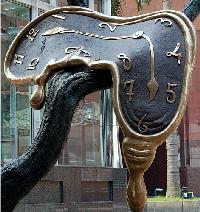|
News & Views item - November 2011 |
![]() How Will Australia Vote On Abolition of the Leap Second? (November 9, 2011)
How Will Australia Vote On Abolition of the Leap Second? (November 9, 2011)
 If
the current political opposition can tear themselves away from agonizing as to
whether the sky will crash with the introduction of a tax on CO2
emissions and both sides of the political divide can overcome their pandering to
the nation's xenophobic voters, perhaps they would like to choose sides as
whether or not the leap second should be abandoned -- that extra second added
every year or two on average to keep Coordinated Universal Time (UTC) in sync
with Earth's slightly unpredictable solar orbit.
If
the current political opposition can tear themselves away from agonizing as to
whether the sky will crash with the introduction of a tax on CO2
emissions and both sides of the political divide can overcome their pandering to
the nation's xenophobic voters, perhaps they would like to choose sides as
whether or not the leap second should be abandoned -- that extra second added
every year or two on average to keep Coordinated Universal Time (UTC) in sync
with Earth's slightly unpredictable solar orbit.
NatureNews reports "Leap seconds are a nuisance", says Elisa Felicitas Arias, the director of the Time Department at the International Bureau of Weights and Measures (BIPM) in Sèvres, France. The suggestion is that if the seconds are not introduced simultaneously in different systems, there is the potential, say the doomsayers, for disco-ordination of the world's computers and possible disasters, financial and otherwise.
Nevertheless, China, Canada and the United Kingdom, among others, want to keep leap seconds to maintain the link with solar time.
Chunhao Han of the Beijing Global Information Center of Application and Exploration says: "Most Chinese scholars think it is important for timekeeping to have a connection to astronomical time because of traditional Chinese culture," China has yet to make its decision as to how it will vote in January.
Włodzimierz Lewandowski, a physicist at the BIPM claims that adding an extra second inconsistently to multiple clocks across satellite networks could cause a system to fail for long enough to cause an air disaster.
According to NatureNews: "The US Global Positioning System ignores leap seconds for just this reason, and Russia's GLONASS system has had problems in the past incorporating the leap. Europe's Galileo system, which launched its first two satellites last month, and China's developing BeiDou system will also mark time with their own internal clocks," but But Markus Kuhn, a computer scientist at the University of Cambridge, UK, says that most problems could be overcome by having a consistent prescription for adding extra seconds.
With Sergey Brin and Larry Page being atop Google perhaps it should come as no surprise that, Google announced a couple of months ago that it would use a 'soft-leap' strategy, to introduce the leap second, i.e. one in which operating systems add portions of the second smoothly over an extended period. Markus Kuhn, a computer scientist at the University of Cambridge says: "This should be the standard approach."
NatureNews' Zeeya Merali lets Peter Whibberley, a physicist at the National Physical Laboratory in Teddington, UK, have the last word who told her that despite 10-years or wrangling: "there's no convincing evidence that anything serious would happen if you made a mistake introducing a leap second into a system," and added that abolishing leap seconds only defers any problems. "A century down the line, we'll need to introduce a 'leap minute', and nobody has any sensible arguments for why that won't be a worse issue."
The ITU-R [International Telecommunications Union - Radiocommunications] released its status paper, Status of Coordinated Universal Time (UTC) study in ITU-R, in preparation for the January 2012 meeting in Geneva; the paper reported that, to date, in response to the UN agency's 2010 & 2011 web based surveys requesting input on the topic, it had received 16 responses from the 192 Member States with "13 being in favour of change, 3 being contrary."